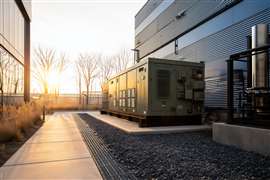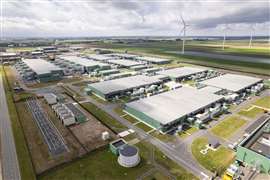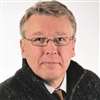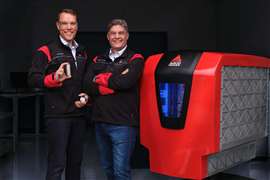Read this article in Français Deutsch Italiano Português Español
Industry association AMPS offers gen set advice
31 October 2025
 Gen sets should be tested under load (Photo: AdobeStock)
Gen sets should be tested under load (Photo: AdobeStock)
The Association of Manufacturers of Power Generating Systems (AMPS) is an organisation based in the UK which represents more than 100 member companies from across the power gen sector. The association shares industry knowledge with its membership and related government departments, outlining the current state of the market and how best to move forward to achieve outlined goals.
Alan Beech was appointed director general of AMPS in Spring 2025. He is well placed to take charge of the group, having previously worked at a series of companies known across the power generation market, including Cummins, Deutz and Rehlko Clarke Energy.
In an exclusive interview with Power Progress International, Beech was asked whether the gen set industry in the UK was still relevant, to which he replied: “If you want an electrified digital economy then you need [energy] resilience, and that’s what our members provide.”
Somewhat paradoxically, Beech continued by saying that he believes it will be impossible to reach net-zero targets without what he called the “inconvenient truth” that backup power generation will sometimes be required.
“Like it or not, if we want the comforts of life which we have enjoyed for the past 40 or 50 years, then we need a secure supply of electrical power. This needs to be taken into account as the country switches from gas boilers to heat pumps, which won’t work if there’s no electricity.”
 Alan Beech, AMPS
Alan Beech, AMPS
“We often recommend less frequent testing and running at load to produce some electricity”
In another case, Beech believes that shutting down existing combined heat and power (CHP) units at major energy consumers, such as hospitals, and replacing them with grid power and heat pumps is not always the correct decision.
“Keeping these systems in place would save money. CHP systems can actually help cut carbon emissions if they are operating in a ‘dirty’ zone of the grid, in areas where there is a low penetration of renewables. CHP energy should be used strategically and not simply abandoned to falsely support Scope 1 emissions numbers that are based on a national average.
“Because people have been chasing reduced greenhouse gas emissions and Scope 1 reductions, these CHP systems were easy targets. Replacing those with heat pumps that require more electricity means larger backup generators are required. Embedded carbon in equipment considered redundant or in replacement equipment is often ignored and larger diesel generators don’t always deliver sufficient emissions reductions to offset the carbon locked within existing equipment. Monthly testing of the gen sets – which we advise is too frequent – also adds to the carbon output.”
Gen set testing
Generator sets need to be tested for a variety of reasons, but the underlying goal is to ensure they are ready to deliver power when needed. But Beech pointed out that there are a number of issues with testing frequency that can impact gen set longevity.
In some cases, gen sets are tested on a monthly basis or even more frequently, which results in unnecessary emissions. He says that this can be self-defeating as tests are often performed with little or no load on the set. This can have a negative impact on the engine and emissions system (DPF, SCR, if fitted), leading to failure when the system is required to act as emergency backup.
“We often recommend less frequent testing and running at load to produce some electricity. This results in emissions but for a real benefit, it’s not wasted energy. If this isn’t an option, then run against an artificial load bank. Owners should still check what is best for their installation, but that’s what we’re doing now at AMPS, trying to get a consolidated agreement on this testing routine from the engine OEMs.”
Beech added that promoting best practise such as this will be key to AMPS becoming a trusted voice across the UK power gen market.
New fuels
Hydrotreated vegetable oil (HVO) and other ‘drop in’ replacements for diesel offer a route to reducing carbon output from backup power generators, but Beech said that there are other elements which need to be taken into account.
 Without resilient back-up power generation for installations such as data centres, there is no security for our electrified and digital economy
Without resilient back-up power generation for installations such as data centres, there is no security for our electrified and digital economy
“People need to ensure that the HVO they’re using has been sustainably sourced. Everyone is drawing on the supply, but there’s not sufficient production for every customer. We’ve heard of cases where fuel has not been produced sustainably, so customers need to be careful with their sourcing.”
In addition, while HVO has a longer shelf life than fossil diesel, it doesn’t mean that users can simply fill up and forget about it. As Beech stated, there are various routes for contaminants to get into a tank, including ventilation systems, meaning that even this fuel type needs to be correctly managed and conditioned.
Net-zero future
Some industry commentators have put forward that it will be impossible to achieve net-zero goals with current tech and given our reliance on fossil fuels. While Beech appears equally unconvinced, he puts forward there is no harm in trying to reach that goal.
“There are things people can do now to reduce carbon, some are even carbon negative. For example, there’s green biomethane, carbon capture technology and possibly using hydrogen, all of which will move us in the right direction – problems with producing and sourcing green hydrogen aside. I’m not saying net-zero is or isn’t achievable, but it’s better to do your best than think it’s simply impossible. I think you need a target of net-zero just to give people something to aim at.”
Despite the increasing percentage of power from renewables being delivered via the national grid, Beech believes that even beyond 2050 there will still be a clear role for island power generation using diesel engines.
“The more reliant we become on electricity as our sole energy source, the more we’ll need emergency – and I’m emphasising ‘emergency’ – backup generators. Certainly for critical services and even to ensure power delivery in some regions, backup power generation will be required for the foreseeable future.”
POWER SOURCING GUIDE
The trusted reference and buyer’s guide for 83 years
The original “desktop search engine,” guiding nearly 10,000 users in more than 90 countries it is the primary reference for specifications and details on all the components that go into engine systems.
Visit Now
STAY CONNECTED




Receive the information you need when you need it through our world-leading magazines, newsletters and daily briefings.
CONNECT WITH THE TEAM













